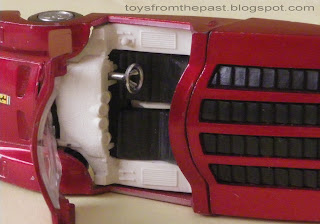HISTORY OF MERCURY ITALY
The car in this entry is the Ferrari 512P
designed by Pininfarina. This model is made in 1:43 scale, all in metal with plastic
interior, windshield and wheels.
Maybe the wheels are the worst thing in the
model since they are plastic and hollow in the interior. The hubcaps however
look great and give the wrong impression of two-parts rim + tyre. This makes me think, that the car could actually be a reedition of the original 1971 model.
The car has opening cockpit plus opening
bonnet, with nice details on the inside: like the steering wheel, highly
detailed cockpit or the simulated motor. It’s only decal is the Ferrari emblem on the
front of the car.
Mercury is the third “classical” die-cast
manufacturer after Polistil/Politoys and Mebetoys. Maybe a step less famous
than the other two, but also with a nice production over many years. The
company was founded in 1932
in Torino by Attilio
Clemente and Antonio Cravero to produce metallic components for the automobile
industry (for “real” cars).
In 1945, the company decides to specialize in
the production of die-cast toys, mostly cars. This turn was quite surprising at
the time, since they were the first toy producers in Italy (together with Rivorossi,
that started also in 1945), right after WWII. They foresaw a quick recovery of Italy after the
disaster of war and an expanding market for quality toys. Other Italian
manufacturers would follow, but much later (for example, Polistil, 1960).
The concurrence to Mercury came from outside Italy. Most
precisely from England,
were Dinky already produced the same type of toy since 1934. The production of
those first years were not only die-cast models, but also traditional toys like
toy kitchens or rifles that could fire grains of rice.
The first toy car (1946) was a 1/40 fictitious
model named “Aero” (looks like a Lancia Aprilia Coupé). This model was not
intended to be sold initially, but as a giveaway to promote SAFAR an italian
radio manufacturer. After those giveaways, it was mass produced from 1946 to
1952 with many colour variations and even with a motor made of a rubber band.
Other models in scales ranging between 1/40 and 1/50 followed. The “standard”
scale of the time was 1:43, the scale that had adopted Dinky and also Solido,
and that would be also adopted by Mercury in 1962. The first models produced
were the ones in the picture below
 |
| Catalogue picture taken from collectors-club-of-great-britain.co.uk |
The cars were sold in cardboard boxes with a
colour illustration on it. The artwork was made by Mario Davazza.
A short series of 1:86 scale cars was also
released around 1949. The name given to this series was Micromercury. These
models could be used in railway modelling (H0 scale), but could also be sold as
cheap toys. Very rare are the models of trains and wagons for railway modelling
made by Mercury.
In 1954, 9 years after the re-foundation of the
company, Mercury produced a 1:48 model of the Fiat 1100 103, which was the
“middle class” car of the time in Italy. This was a great success.
Fiat had a great relation with Mercury as it had with Rivarossi, up to the
point of showing drawings and confidential designs of cars that were not yet in
production. For example, Mercury built a 1:43 Fiat 850 before the car was
produced intended to be a giveaway in the presentation of the car (May 1964).
By this time, Polistil and many other competitors had already started their
businesses and the models are not so detailed anymore. If until now it was
common to find cars with practicable doors, bonnet and trunk, that Fiat from
1964 only had opening bonnet. The price had to remain under 600 lire.
By the end of the 60s, Mercury still had those
price restrictions and launched the “Special” collection with even fewer
details that were sold for around 500 lire.
 |
| Mercury's Ferrari 512S cockpit detail |
 |
| Mercury's Ferrari 512S motor detail |
The 70s were a period of decadence. The
founders died in this decade, the catalogue had each year fewer and fewer
models (most re-releases of older models), with almost no new models, whose
cast costs couldn’t be afforded. Even the packages couldn’t be updated and the
toys were still being sold with the obsolote cardboard box with no windows.
Many think that the “ coup de grace” for
Mercury was the start of the Bburago series in 1:43. The company sadly closed in
1978. The last model produced was a Fiat Ritmo.
The company is not to be confound with the
American company Mercury, which also did some toy cars and trucks, and even
with similar or shared casts.
Information for this article was taken from http://www.rivarossi-memory.it/Altre_Marche/Mercury/RR_Mercury.htm
(italian).
This is the second model by Mercury that
appears in this blog. The other one was a race motorbike published very early
(#2).
I also used the tag Mercury for some other Guiloy motorbikes, since the casts
are shared between the Spanish and the Italian companies. This Ferrari itself
was also made (same or very similar cast) by Pilen and Joal, and before by
Mebetoys/HotWheels! (same or very similar cast) and also by Politoys (different
cast).
Some other time, we will talk about Speedy, the
1:64 collection by Mercury. I own just one model of these.
FACTS AND
FIGURES:
- Name: FERRARI 512S (Nr. 66)
- Scale: 1:43 (approx.)
- Year: 1971 (model shown is a re-edition, maybe 1975?)
- Company: Mercury (Italy)
- Size: approx. 10 cm

.jpg)






Lo tengo en dorado, preciosa pieza, magnífica.
ReplyDeleteOstras, pues en dorado no lo había visto nunca... ¿es también marca "mercury"? a ver si lo muestras en tu blog.
ReplyDelete